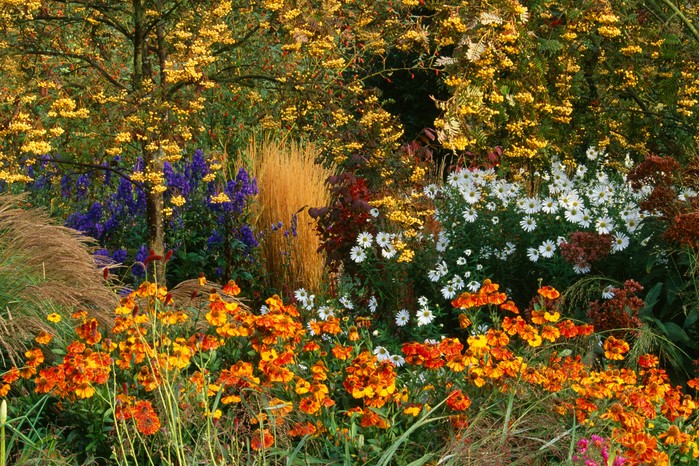
Spindle tree, also known as European spindle tree (Euonymus europaeus) is a native shrub or small tree that goes largely unnoticed for most of the year but then more than makes up for it in autumn, when its leaves and fruits take centre stage. The foliage turns bright shades of red, which are complemented by pink fruits that split open to reveal orange seeds (known as arils). The fruits remain on the tree for some time and, as well as being attractive, they are an excellent source of food for birds in winter. Outside autumn, spindle is a fantastic wildlife plant, as its leaves are eaten by several species of moth, including the spindle moth, and its inconspicuous flowers are visited by pollinators.
All parts of European spindle can cause discomfort if ingested – wear gloves and wash hands after handling.
Eurpean spindle is one of many shrubs or small trees in the Euonymus genus. For more types of Euonymus, including burning bush and Japanese spindle, see our guide to the best euonymus plants.
How to grow spindle
Grow spindle in moist but well-drained soil in full sun. Prune out damaged, dead or crossing branches in late-winter to spring, and mulch annually with well-rotted manure, leaf mould or home-made compost.
Where to grow spindle
European spindle growing beneath a rowan and among autumn flowers
Spindle tree is perfect for growing in a mixed border, woodland edge or front garden, in a position where you can make the most of its autumn colours. You can also grow it as a hedge, or as pat of a mixed native hedge with other species such as hawthorn and hazel. Grow spindle in full sun to partial shade – those in sun have the best autumn colour.
How to plant spindle
You can plant pot-grown plants at any time of year, but spring and autumn are the best times, when the soil is warm and moist.
- Water the plant thoroughly before planting. Dig a hole at least twice the width of the rootball and the same depth. Use a fork to break up the sides and base of the hole
- Remove the shrub from its pot and tease out any spiralling roots. Place the plant in the hole with the roots spread out and the top of the rootball level with the ground
- Partly backfill around the roots with the excavated soil and firm gently to get rid of any air pockets, so the roots are in good contact with the soil. Then top up with more soil if necessary and firm down
- Water in well and keep watered during dry spells
You can also plant bare-root spindles from autumn to spring.
Read more about planting shrubs.
How to care for spindle

The fruits of the burning bush
Spindle is very easy to care for and does not need regular pruning. However you may wish to remove damaged, dead or crossing branches from late winter to spring. Mulch annually with well-rotted manure, leaf mould or home-made compost.
How to propagate spindle tree

Removing bright orange spindle tree seeds from their bright pink seed capsules
Spindle can be propagated easily from seed. The seeds are dormant and need to be ‘stratified’ (exposed to cold, damp conditions) to trigger germination. This would occur naturally in the ground over winter, but you can mimic this process by popping the seeds in the fridge.
More like this
- Wait until the seed capsules split open, revealing ripe orange seeds inside. Always wear gloves or wash hands after handling, as all parts of this plant are toxic
- Remove the seeds from their capsules
- Place the seeds in a bag filled with damp (but not wet) vermiculite or sharp sand. Mix in gently. Leave the bag slightly open to let air circulate. Label with the date
- Keep warm (at around 15ºC) for 10 weeks and don’t let them dry out. Then put them in the fridge for up to 16 weeks. Once the seeds have sprouted, sow immediately.

A bag of spindle tree seeds and damp vermiculite in a fridge for cold exposure to trigger germination
Sow spindle seeds in pots filled with good-quality, peat-free seed compost. Keep them watered and weed free, protect them from mice and grow on for a year or two before planting in their final positions.
Growing European spindle: pests and diseases
Spindle is generally problem free. Powdery mildew may be a problem – minimise the risk by mulching the plant to conserve moisture in the soil and keeping well watered.
Advice on buying a spindle tree
- You may find a spindle tree at the garden centre in autumn, otherwise look online
- Check that you have the right spot for a spindle – for the best autumn colour, grow in full sun
- Always check for signs of damage or disease before planting
Where to buy a spindle tree online
Varieties of spindle to grow
Euonymus europaeus ‘Red Cascade’ – has an even better display of autumn leaves and winged fruit than the species. Height x Spread: 3m x 2.5m
